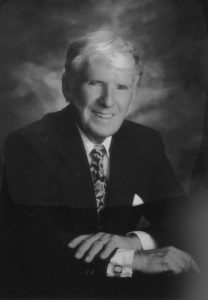 The final interview C. S. Lewis gave was with Sherwood Wirt of the Billy Graham Evangelistic Association. Wirt spoke with him at Cambridge University in May of 1963, just six months before Lewis died. I was re-reading that interview this morning and found it enlightening as to Lewis’s thoughts during that final stage of his life—although, of course, he didn’t realize he was in the final stage.
The final interview C. S. Lewis gave was with Sherwood Wirt of the Billy Graham Evangelistic Association. Wirt spoke with him at Cambridge University in May of 1963, just six months before Lewis died. I was re-reading that interview this morning and found it enlightening as to Lewis’s thoughts during that final stage of his life—although, of course, he didn’t realize he was in the final stage.
At first, Wirt was interested in drawing out Lewis on the type of writing Christians should do. When asked his opinion of the kind of Christian writing being done at that time, Lewis was blunt:
A great deal of what is being published by writers in the religious tradition is a scandal and is actually turning people away from the church. The liberal writers who are continually accommodating and whittling down the truth of the Gospel are responsible.
I cannot understand how a man can appear in print claiming to disbelieve everything that he presupposes when he puts on the surplice. I feel it is a form of prostitution.
Strong words.
As the interview proceeded, Wirt asked Lewis how Christians can help foster an encounter of people with Christ. “You can’t lay down any pattern for God,” Lewis replied, but added that he had learned to be cautious in passing judgment on different approaches to delivering the Gospel. Above all, he urged commitment to the message:
As Christians we are tempted to make unnecessary concessions to those outside the Faith. We give in too much. Now, I don’t mean that we should run the risk of making a nuisance of ourselves by witnessing at improper times, but there comes a time when we must show that we disagree. We must show our Christian colours, if we are to be true to Jesus Christ. We cannot remain silent or concede everything away.
Lewis also decried the increasing use of obscenity in literature in order to create what some called a more “realistic atmosphere.” He viewed that development with dismay, seeing it as “a symptom, a sign of a culture that has lost its faith.” There is a progression, Lewis warned: “Moral collapse follows upon spiritual collapse. I look upon the immediate future with great apprehension.”
Modern culture, he felt, was in the throes of de-Christianization. While he refrained from commenting on the political aspects of this development, he did have “definite views” on what was happening within the church:
I believe there are many accommodating preachers, and too many practitioners in the church who are not believers. Jesus Christ did not say, “Go into all the world and tell the world that it is quite right.” The Gospel is something completely different. In fact, it is directly opposed to the world.
The interview concluded with Wirt asking Lewis what he thought would be occurring “in the next few years of history.” Lewis’s response was quite practical—and Biblically based:
I have no way of knowing. . . . The world might stop in ten minutes; meanwhile, we are to go on doing our duty. The great thing is to be found at one’s post as a child of God, living each day as though it were our last, but planning as though our world might last a hundred years.
He then echoed words he had written in more than one of his earlier writings:
We have, of course, the assurance of the New Testament regarding events to come. I find it difficult to keep from laughing when I find people worrying about future destruction of some kind or other. Didn’t they know they were going to die anyway? Apparently not.
My wife once asked a young woman friend whether she had ever thought of death, and she replied, “By the time I reach that age science will have done something about it!”
Unlimited faith in man’s science is a fantasy. We all will die. The only question that really matters is whether we have remained at our post as a child of God, continuing to do His will until the end comes. Lewis did exactly that in the six months he had left. We need to follow his example.
